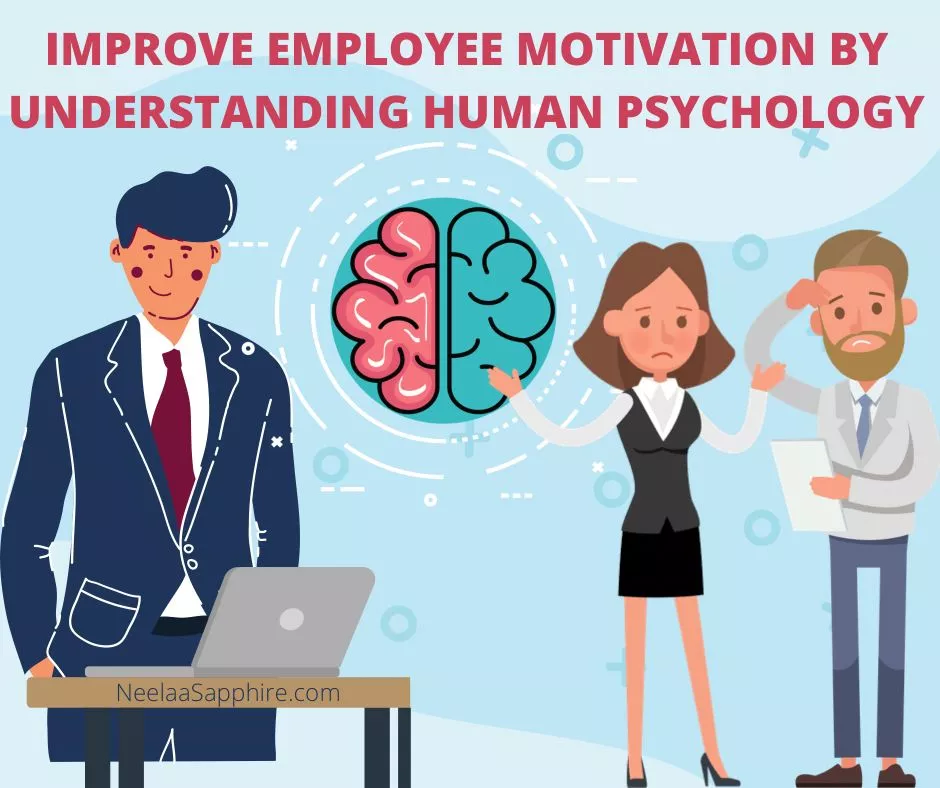
Employee motivation is vital to keep running a successful and profitable business. Motivation is the key a business can encourage its workforce to work at their highest potential. Motivated staff can increase the success of the business through more efficient and better work output. A motivated workforce results in increased output, improved quality and a higher level of staff retention.
Money plays an important role in motivation. Management make use of financial incentives such as salaries, bonus, retirement benefits, health insurance, and other financial perks to motivate employees. In short, money is considered to be the real motivating factor. However, this is not always the case. There are other non-financial motivators which can encourage employees to perform well in their workplace. Employee motivation in the business industry cannot solely depend on money.
Free sample questionnaire down below
Also Read: Top 3 Causes of Internet Addiction
Maslow’s Employee Motivation Theory:
Hierarchy of Needs
According to Abraham Maslow (1954), people are motivated more than just money. He has proposed the idea that employees must be satisfied with the lower levels of needs and wants first then they can move on to the top of the hierarchy, which is self-actualization.
Money is the basic need to full-fill the basic needs and wants of employees. However, after they are full-filled, employees look for other factors to motivate them to work. High employee motivation can be gained by sense of authority leading to self-actualization. It is important that an employee feels needed and trusted. When a manager delegates important tasks to employees, they feel empowered. The challenging tasks, drives employees to work efficiently, unknowingly it boosts their self-esteem and creativity as they have to think and perform jobs which they are not used to doing.
To further boost employee motivation amongst the workforce a decentralized organization would be beneficial. This type of organization allows lower level of management to make decisions. These decision making powers will give employees purpose and the opportunity to make a difference. The ability to make decisions is a step forward to gain self-actualization, which cannot be fulfilled with money.
Self-actualization is the main motivator factor for employees to find their highest potential and realize what they can achieve on their own. When businesses provide opportunities for their employees by giving them authority, they gain personal development which encourages them to reach their highest potential. This makes employees independent and as a result helps them to realize and nurture their talents and further grow in their career. This realization and encouragement cannot be gained financially. Therefore, money solely cannot contribute to employee motivation but also the encouragement for one to reach one’s highest potential can increase motivation.
Also Read: How Digital transformation is changing the industries aspects
Herzberg’s Employee Motivation Theory:
Two-factor theory
Herzberg (1962), introduced the two-factor theory; the hygiene factors (mainly physical) and motivators factors (mainly psychological). The theory argues that there are two main factors that contribute to employee motivation in an organization.
- Motivators: Factors which encourages employee to work more efficiently and are related to job satisfaction
- Hygiene factors: If not present or provided poorly these factors contribute to decreasing job satisfaction and thus, employee motivation.
Motivators can lead to the psychological growth of employees and thus increase satisfaction and performance at work. Businesses can train their workforce to perform tasks that they were not capable of doing when they were recruited to increase employee motivation. Intrinsic motivators tend to represent less tangible and more emotional needs, such as challenging work, recognition, relationships, and growth potential.
According to Herzberg, hygiene factors are those aspects of work which do not motivate employees but must be met to avoid dissatisfaction. Salary is an example of hygiene factors; Herzberg claims that a pay rise does not motivate employees itself, but if it is absent, it can cause dissatisfaction as their expectations are not met.
On the other hand, motivators are the real factors which encourage employees. Motivators are directly related to the job itself and it includes job enlargement and job enrichment. Giving more variety of work to the employees increasing their motivation level and job satisfaction. The experience of complex and challenging tasks helps them with a sense to explore their potential and provides them with sense of achievement.
Herzberg’s theory reinforces that employees are motivated by making them feel responsible towards their work. When an employee is working on a task, they do it because it is required of them and to sustain them in the job. However, employees should rather feel motivated to work because they want and explore new learnings and not solely for the sake of the pay received.
Also Read: Web design and its Business benefits
Pink’s Employee Motivation Theory:
Having a purpose drives employees to work every day as it guides and inspires them. William Bill Gates, founder of Microsoft has an estimated net worth of US $150 billion as of September 2021 however, he still works every single day. What motivates him to work is the purpose to improves people’s everyday life.
Extrinsic desires such as money and other rewards is not the primary motivators whereas intrinsic motivators are the key for motivating people. Pink (2009), argues that extrinsic factors no longer effective as now in the twenty-first century employees look for factors more than just the money they receive.
Pink’s theory proposes that there are three innate factors that drive people at work; autonomy (self-sufficient to direct one’s own life), mastery (self-improvement to learn and to advance) and purpose (self-esteem and drive to do better).
- Autonomy in various aspect of an employee’s work life can lead to motivation to new initiatives at work. These can be done through flexi–timing, technology, projects etc.
- Mastery allows individuals to become better at their work that matters to them as individuals. People generally want to improve their work as it makes them feel better.
- The two innate factor leads to a purpose which gives context to autonomy and mastery. One needs to understand the purpose of why they are working in order to be motivated. These innate factors cannot be achieved with financial gains.
Although Pink’s theory does not focus on financial rewards, he acknowledges the fact that without adequate baseline rewards such as salaries, employees cannot satisfy their personal needs. However, financial perks can be the initial drive but motivation is sole reason for employees to continue doing their job at the desired efficiency level.
Combining the employee motivation theories
High employee motivation can be gained through other non-financial perks. The theorists, Maslow, Herzberg and, Pink have shown how self-actualization, psychological growth and purpose are vital motivators. The importance of these are the initial drivers of what employees look for in their work, money is just a basic need which is required to fulfill the basic wants of the employees.
The motivators provide with job satisfaction and encouragement to work at their highest potential providing with efficient output to the firm. Therefore, money cannot be the only motivator to motivate employees. As times goes by, the importance of non-financial perks in an employee’s work life will increase, as it will be beneficial for them to grow in their respective careers, so money will just be a need.
Free Sample Questionnaire
This sample questionnaire could be used to understand your employees better. It will help you understand their problems, their perspectives and areas of improvement for you or your company to make.
Keep in mind this is just a sample and should be modified according to you or your companies issues.
